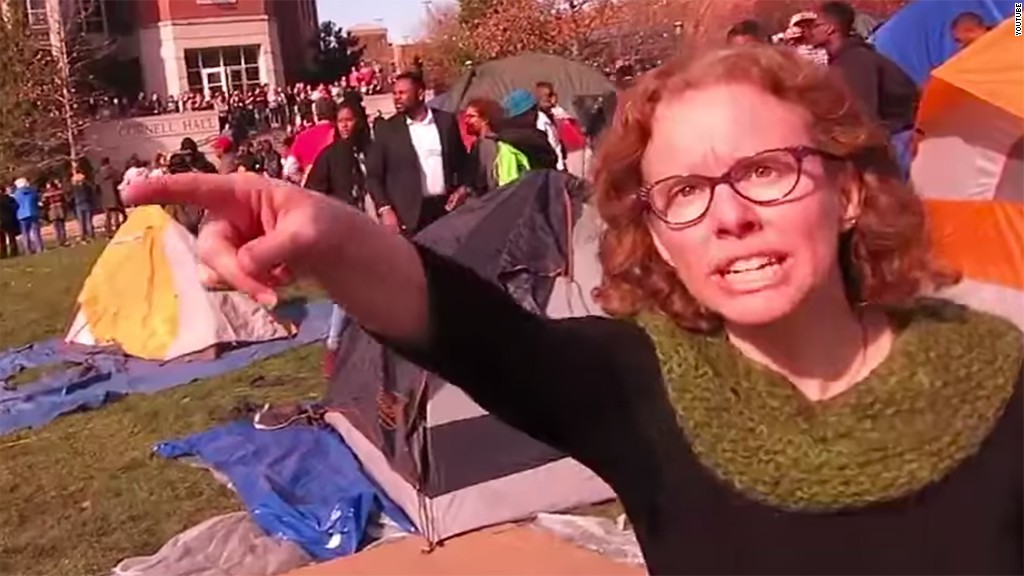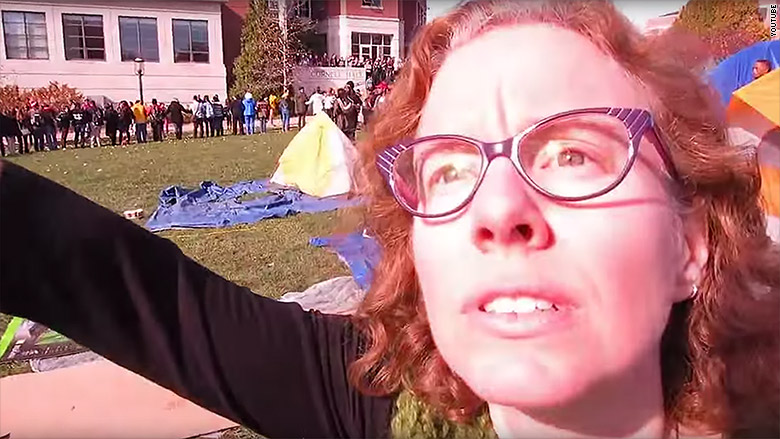
The University of Missouri professor who was filmed blocking media access to a campus protest has cut ties with the school's journalism program and apologized for her actions.
Melissa Click, an assistant professor of mass media at the university's School of Communications, apologized Tuesday to the campus community and to "journalists at large" for hindering a photographer and cameraman who were trying to document the protests over racism on campus.
That exchange went viral on social media and become a flashpoint in an ongoing debate over free speech and political correctness on college campuses.
"I have reviewed and reflected upon the video of me that is circulating, and have written this statement to offer both apology and context for my actions," Click wrote in her statement, in part. "I regret the language and strategies I used, and sincerely apologize to the MU campus community, and journalists at large, for my behavior, and also for the way my actions have shifted attention away from the students' campaign for justice."
Click said she had reached out to one of the reporters involved and said he had accepted her apology.
David Kurpius, dean of the university's School of Journalism, said that Click has resigned her courtesy appointment with the school. She remains a professor in the School of Communications.
Click initially appeared to be an unlikely poster child for media intolerance. Last Saturday, as the protests at University of Missouri were heating up, she had invited the national media to cover the event.
"Hey folks, students fighting racism on the MU campus want to get their message into the national media," she wrote. "Who among my friends knows someone who would want a scoop on this incredible topic? The story involves the failure of administrators, a student on day 6 of a hunger strike, and creative, fearless students. If you can help, please let me know!"
By Monday, however, Click had become known as as the protester who grabbed a journalist's video camera, told him he had no right to be there, then asked for "muscle" to have him removed from the scene.
"Who wants to help me get this reporter out of here? I need some muscle over here," Click shouted to her fellow protesters at Concerned Student 1950, a student and faculty group that says it seeks the "liberation of black collegiate students."
Related: Protesters clash with media at University of Missouri
Click's exchange with the cameraman, Mark Schierbecker, came after she and other protesters had argued with a photographer named Tim Tai about whether or not he had the right to be there, then removed him from the scene by walking against him until he was forced to leave.
"Hey hey, ho ho, reporters have got to go," shouted several protesters, including Janna Basler, the director of Greek life and leadership at Missouri.
Those exchanges, which were captured on video by Schierbecker, have since gone viral and set off a fierce debate over freedom of expression on college campuses.

"The student protest at the University of Missouri began as a response to a serious problem — outbursts of vile racism on campus — and quickly devolved into an expression of a renewed left-wing hostility to freedom of expression," New York Magazine columnist Jonathan Chait wrote on Tuesday.
The same argument has been made -- although in less nuanced terms -- on several conservative websites and across social media. At The American Conservative, senior editor Rod Dreher called Click a "fanatic" and a "radical professor."
While Click's image has spread across the Internet -- on websites ranging from The New York Times to Gawker to Breitbart News -- the communications professor has sought to diminish her online presence, blocking access to her Twitter account and removing her profile picture. (Basler has deleted her Twitter account entirely.)
Click also did not respond to requests for an interview on Monday night and Tuesday morning.
On Twitter, Concerned Students 1950 has said that it asked "for no media in the parameters so the place where people live, fellowship, & sleep can be protected from twisted insincere narratives."
By Tuesday afternoon, however, the group had changed course. Reuben Faloughi, one of the group's organizers, tweeted an image of a flier announcing that media have a First Amendment right to the area and that they should be welcomed and thanked for sharing the group's story with the world.
Meanwhile, Click continued to face criticism, online and on campus.
On Tuesday, Kurpius accused her and other protesters of trying to block media access "through physical and verbal intimidation" and said he was taking "immediate action" to review the courtesy appointment Click had with the journalism school. Click never had a teaching role in the journalism department, he said.
Mitchell S. McKinney, chairman of the Communications Department, tweeted a statement to "applaud student journalists who were working in a very trying atmosphere... Intimidation is never an acceptable form of communication."
Katherine Reed, an associate professor in the Missouri Journalism School, also expressed outrage on Twitter on Monday: "MU faculty member [Melissa Click] and staffer [Janna Basler], shame on you for your behavior today. Shame!" she wrote. "Unbelievable how many times [Columbia Missourian] reporters and photographers were shoved and verbally abused during #ConcernedStudent1950 protests," she added.
In an interview with CNN late Monday night, Tai, the photographer, said it was "patently absurd" for Click, Basler and the other protesters to tell him he wasn't allowed to be in a public space. The First Amendment that protected their right to protest also protected his right to photograph that protest, he said.
Both the Missouri Journalism School and The New York Press Club saluted Tai on Tuesday, with the press club praising him for standing his ground "in the face of physical and verbal abuse."


